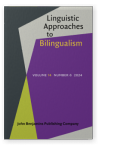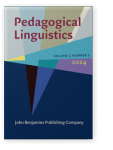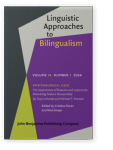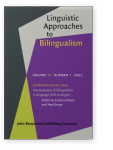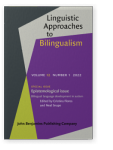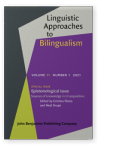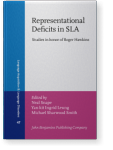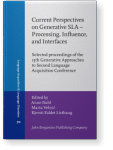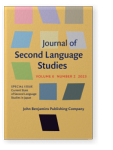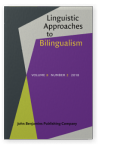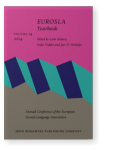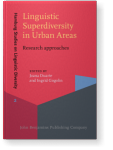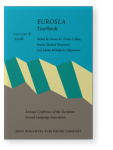Neal Snape
List of John Benjamins publications for which Neal Snape plays a role.
Journals
ISSN 2665-9581 | E-ISSN 2665-959X
Epistemological issue: The importance of features and exponents: Dissolving Feature Reassembly
Edited by Cristina Flores and Neal Snape
Special issue of Linguistic Approaches to Bilingualism 14:1 (2024) vi, 114 pp.
Subjects Cognition and language | Cognitive psychology | Language acquisition | Multilingualism | Psycholinguistics | Theoretical linguistics
Epistemological issue: The dynamics of bilingualism in language shift ecologies
Edited by Cristina Flores and Neal Snape
Special issue of Linguistic Approaches to Bilingualism 13:1 (2023) vi, 132 pp.
Subjects Cognition and language | Cognitive psychology | Language acquisition | Multilingualism | Psycholinguistics | Theoretical linguistics
Epistemological issue: Bilingual Language Development in Autism
Edited by Cristina Flores and Neal Snape
Special issue of Linguistic Approaches to Bilingualism 12:1 (2022) vi, 102 pp.
Subjects Cognition and language | Cognitive psychology | Language acquisition | Multilingualism | Psycholinguistics | Theoretical linguistics
Epistemological issue: Sources of knowledge in L3 acquisition
Edited by Cristina Flores and Neal Snape
Special issue of Linguistic Approaches to Bilingualism 11:1 (2021) vi, 129 pp.
Subjects Cognition and language | Cognitive psychology | Language acquisition | Multilingualism | Psycholinguistics | Theoretical linguistics
Representational Deficits in SLA: Studies in honor of Roger Hawkins
Edited by Neal Snape, Yan-kit Ingrid Leung and Michael Sharwood Smith
[Language Acquisition and Language Disorders, 47] 2009. xxv, 250 pp.
Subjects Language acquisition | Syntax | Theoretical linguistics
2024 Chapter 6. L2 acquisition of English flexible count and flexible mass nouns by L1-Japanese and L1-Spanish speakers Current Perspectives on Generative SLA - Processing, Influence, and Interfaces: Selected proceedings of the 16th Generative Approaches to Second Language Acquisition Conference, Velnić, Marta, Anne Dahl and Kjersti Faldet Listhaug (eds.), pp. 134–169 | Chapter
We examine the acquisition of the English count-mass distinction, in particular flexible nouns. Certain nouns are flexible in English as they can be either countable like a cake / cakes or mass such as cake. Our study is unique regarding the off-line and on-line tasks used and the L2 participant… read more
2023 An investigation of subject-orientation in the processing of Japanese reflexive zibun by native Japanese and Chinese-speaking learners Current State of Second Language Studies in Japan, Matthews, John and Shigenori Wakabayashi (eds.), pp. 348–377 | Article
The study investigates the L2 acquisition of the Japanese reflexive zibun (self) by Chinese-speaking learners. The aim of the study was to find out whether there are any differences in the interpretation and processing of zibun, a long-distance reflexive that takes as its antecedent only… read more
2023 Second language processing of English definite noun phrases by Spanish speakers and Japanese speakers Current State of Second Language Studies in Japan, Matthews, John and Shigenori Wakabayashi (eds.), pp. 319–347 | Article
The present study examines the acquisition of definite noun phrases (NPs) in L2 English. Both English and Spanish have a definite article, but Japanese lacks articles, though definite anaphoric and definite non-anaphoric are present to some degree through the optional use of sono (the/that). A… read more
2018 Acquisition of scalar implicatures: Evidence from adult Japanese L2 learners of English Linguistic Approaches to Bilingualism 8:2, pp. 163–192 | Article
Our study investigates the second language (L2) acquisition of scalar implicatures some and all. We set out to answer two research questions based on three theoretical accounts, the lexical, pragmatic and syntactic accounts. In an experiment we include English and Japanese native speakers, and… read more
2014 Aspect in L2 English: A longitudinal study of four Japanese child returnees EUROSLA Yearbook: Volume 14 (2014), Roberts, Leah, Ineke Vedder and Jan H. Hulstijn (eds.), pp. 79–110 | Article
Our study reports on data collected on three separate occasions over a period of 12 months from four Japanese child returnees who had lived in the U.S. between 8 and 12 years before returning to Japan. Their English proficiency was assessed by TOEIC and C-test scores, and they were each asked to… read more
2013 Foreign language acquisition in heritage speakers: The acquisition of articles in L3-English
by German-Turkish bilinguals Linguistic Superdiversity in Urban Areas: Research approaches, Duarte, Joana and Ingrid Gogolin (eds.), pp. 99–122 | Article
L3 acquisition has been a topic of increasing interest throughout the past decade. Nevertheless, linguistically-oriented work has so far paid little attention to the acquisition of foreign languages by second generation minority (or heritage) speakers, who have acquired two languages in early… read more
2009 Exploring Mandarin Chinese speakers' L2 article use Representational Deficits in SLA: Studies in honor of Roger Hawkins, Snape, Neal, Yan-kit Ingrid Leung and Michael Sharwood Smith (eds.), pp. 27–51 | Article
This paper attempts to explore the difficulties Chinese speakers have with the acquisition of English articles by situating itself within three hypotheses by using two tasks; a written forced choice elicitation task and an oral elicited picture description task. Our findings from the first task are… read more
2009 Introduction Representational Deficits in SLA: Studies in honor of Roger Hawkins, Snape, Neal, Yan-kit Ingrid Leung and Michael Sharwood Smith (eds.), pp. xv–xxv | Article
2006 Accounting for English article interpretation by L2 speakers EUROSLA Yearbook: Volume 6 (2006), Foster-Cohen, Susan H., Marta Medved Krajnovic and Jelena Mihaljević Djigunović (eds.), pp. 7–25 | Article
Ionin, Ko and Wexler (2004a) have shown that L2 speakers of English whose L1’s lack articles (Russian and Korean) appear to fluctuate in their interpretation of the and a, allowing them to encode either definiteness or specificity. They argue that these are two options of an Article Choice… read more
